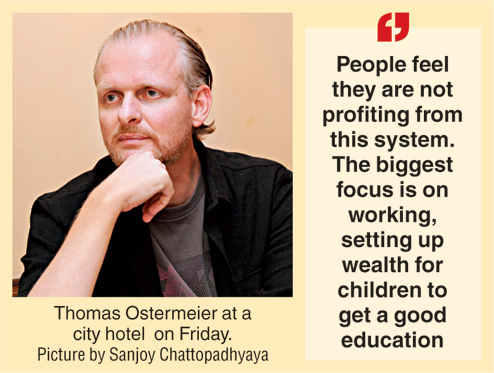
How will the audience react when it is invited to participate in the debate at the centre of Thomas Ostermeier's Berlin Schaubühne production of Henrik Ibsen's play, An Enemy of the People, which is being staged at Kala Mandir on Saturday evening?
Delhiities have already seen this stimulating production on February 18, and Ostermeier says "audience reaction was good. They were all very excited".
Calcutta has a long association with Ibsen and with An Enemy of the People in particular. Satyajit Ray had made a film of it titled Ganashatru and Sambhu Mitra's stage production was Dasachakra. How would the Calcutta audience receive Ostermeier's adaptation (German version by Florian Borchmeyer), where he deviates from the original text, and has even planted David Bowie's Changes in it?
Ostermeier, who is here, and was feeling a little ill on Friday afternoon after all those international flights, seems unperturbed. He says his production should be treated as a "new play, a contemporary play".
Ostermeier, a big man with deep-set eyes, was born in 1968. He is the kind of theatre-maker who is not unused to dining with heads of state, and has led the Schaubühne, which was founded in 1962, since 1999. This leading German theatre house is known for its outstanding experimental productions of both classical and contemporary. An Enemy of the People is being presented by Goethe-Institut/Max Mueller Bhavan Kolkata and the foreign office of the Federal Republic of Germany, in association with t2, Ranan and Altitude Media.
Ostermeier asserts that he is "truthful to the spirit of the play" and he is faithful to its "core." He explained later that when it came to Shakespeare, the blank verse was not translated. He tried "to get closer to the content."
Ostermeier turns Dr Stockmann, the protagonist, who faces the hostility of his town for announcing the truth about the contaminated source of water of the famed spa, into a young man, and merges his daughter with his wife as the role of women was weak. "They are my generation. They have the hipster mentality," says Ostermeier. They pretend to be politically and ecologically aware. These young, urban people live in Berlin and other big cities, but when it comes to voting, their courage deserts them. He cites the examples of the struggle in Greece and the failure of Occupy Wall Street.
These young, rebellious people attack the older generation - the 1968 generation. But that is "boring" for they were the ones who brought about change, says Ostermeier.
Changing his stance all of a sudden, Ostermeier launches a broadside: "Let's name it. Let's not avoid that. Capitalism." He is neither Stalinist nor Maoist, but he is "living in the centre of a financial system that is based on exploitation" and he is "criticising it from there."
What passes for neo-liberalism is "hardcore capitalism." There are alternatives to that - the social democratic way. "People feel they are not profiting from this system. The biggest focus is on working, setting up wealth for children to get a good education." They only care for themselves. But he is "not giving any answers or solutions". He only talks about it and analyses it.
It is not surprising that Ostermeier has produced English playwright Mark Ravenhill's play with the self-explanatory title Shopping and F***g. Till you drop. One can add.
In such a situation, the protagonist "finds truth and no way of expressing it" and turns into a "political extremist."
"If we don't give enough space for other views we are pushed to political extremism." Ostermeier seems to have a lot of time for India and wants to return with Shakespeare. He is impressed by the "powerful and passionate audience." But as he himself admits: He is expensive.











